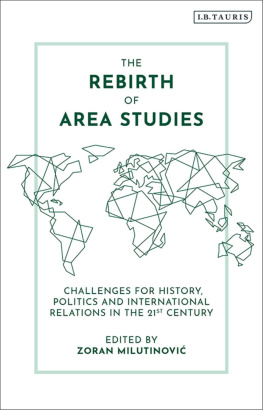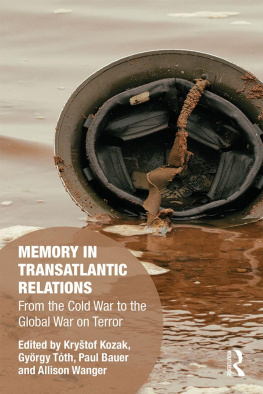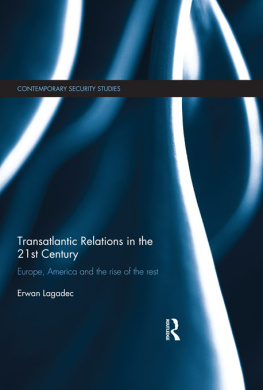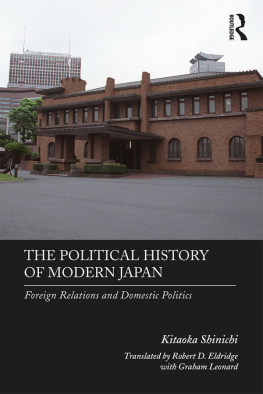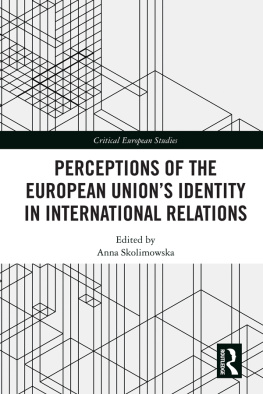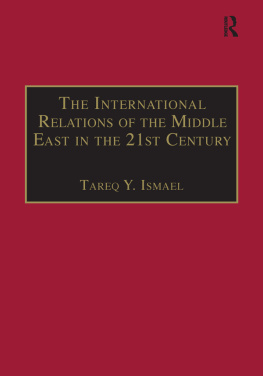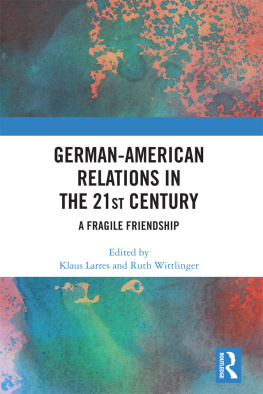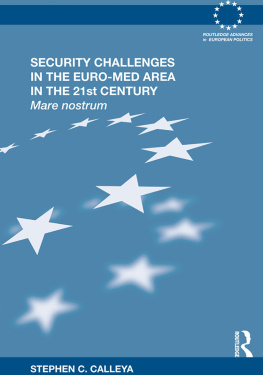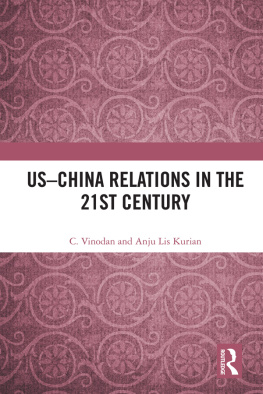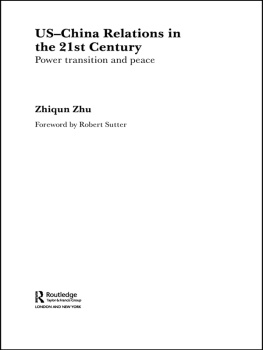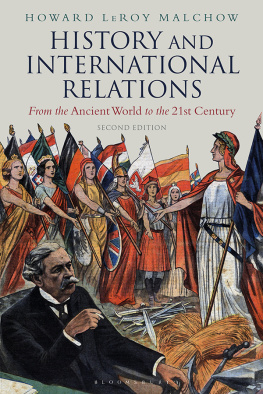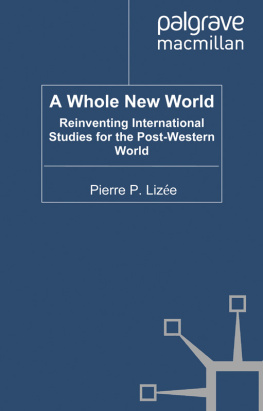Zoran Milutinović - The Rebirth of Area Studies: Challenges for History, Politics and International Relations in the 21st Century
Here you can read online Zoran Milutinović - The Rebirth of Area Studies: Challenges for History, Politics and International Relations in the 21st Century full text of the book (entire story) in english for free. Download pdf and epub, get meaning, cover and reviews about this ebook. year: 2019, publisher: I. B. Tauris, genre: Politics. Description of the work, (preface) as well as reviews are available. Best literature library LitArk.com created for fans of good reading and offers a wide selection of genres:
Romance novel
Science fiction
Adventure
Detective
Science
History
Home and family
Prose
Art
Politics
Computer
Non-fiction
Religion
Business
Children
Humor
Choose a favorite category and find really read worthwhile books. Enjoy immersion in the world of imagination, feel the emotions of the characters or learn something new for yourself, make an fascinating discovery.
- Book:The Rebirth of Area Studies: Challenges for History, Politics and International Relations in the 21st Century
- Author:
- Publisher:I. B. Tauris
- Genre:
- Year:2019
- Rating:3 / 5
- Favourites:Add to favourites
- Your mark:
- 60
- 1
- 2
- 3
- 4
- 5
The Rebirth of Area Studies: Challenges for History, Politics and International Relations in the 21st Century: summary, description and annotation
We offer to read an annotation, description, summary or preface (depends on what the author of the book "The Rebirth of Area Studies: Challenges for History, Politics and International Relations in the 21st Century" wrote himself). If you haven't found the necessary information about the book — write in the comments, we will try to find it.
Zoran Milutinović: author's other books
Who wrote The Rebirth of Area Studies: Challenges for History, Politics and International Relations in the 21st Century? Find out the surname, the name of the author of the book and a list of all author's works by series.
The Rebirth of Area Studies: Challenges for History, Politics and International Relations in the 21st Century — read online for free the complete book (whole text) full work
Below is the text of the book, divided by pages. System saving the place of the last page read, allows you to conveniently read the book "The Rebirth of Area Studies: Challenges for History, Politics and International Relations in the 21st Century" online for free, without having to search again every time where you left off. Put a bookmark, and you can go to the page where you finished reading at any time.
Font size:
Interval:
Bookmark:
The Rebirth of Area Studies
The Rebirth of Area Studies
Challenges for History, Politics and International Relations in the 21st Century
Edited by
Zoran Milutinovi

This volume results from the conference Area Studies in the 21st Century, held at UCL on 9 November 2015, and organized by the Centre for East European Language Based Area Studies (CEELBAS) with the support of the three other national Area Studies centres created within the scope of the UKs funding councils Language Based Area Studies initiative (20062016): the Centre for Russian, Central and East European Studies (CRCEES), the White Rose East Asia Centre, and the Centre for the Advanced Study of the Arab World (CASAW). We are grateful to the Art and Humanities Research Council and the British Academy for generously supporting the second phase of the LBAS initiative and for funding this conference. We would also like to thank Thomas Stottor, who commissioned this book for I.B. Tauris and patiently made sure that we did not drift away, and Thomasz Hoskins and Nayiri Kendir, who helped us bring it to completion.
Wendy Bracewell is Professor of Southeast European History at the School of Slavonic and East European Studies, UCL. She has written about the three-way border between the Habsburg Monarchy, the Ottoman Empire and the Venetian territories in Dalmatia in the sixteenth century, and about the ways travel writers from eastern Europe have used the idea of Europe and its borders to position themselves and their societies from the sixteenth to the twentieth century. She is currently writing a study of centres and peripheries in the production of knowledge in the eighteenth century, and the ways these appear in polemics over travellers accounts.
Claus Bech Hansen holds a PhD from the European University Institute in Florence/Italy and his work focuses on migration, development and state transformation. Claus has worked as researcher and lecturer at various universities and is currently at UNICEF, where he works on mobility, displacement and the rights of migrants and refugees.
Zoran Milutinovi is Professor of South Slav Literature and Modern Literary Theory at the School of Slavonic and East European Studies, UCL, member of Academia Europaea and co-editor of Brills book series Balkan Studies Library. He is author of five books, most recently Bitka za prolost. Ivo Andri i bonjaki nacionalizam (2018) and Getting Over Europe. The Construction of Europe in Serbian Culture (2011).
Susan Hodgett is Professor of Area Studies at the University of East Anglia. She has published widely on Area Studies, narratives and the Capability Approach. She is currently Chair of the Area Studies sub-panel in the UK Research Excellence Framework to 2021. She was Principal Investigator of the Arts and Humanities Research Councils Blurring Genres Network to 2018 (https://www.ulster.ac.uk/faculties/arts-humanities-and-social-sciences/schools/applied-social-policy-sciences/research/blurring-genres) and is currently writing on Politics, Narratives and the Visual Arts with Professor Rod Rhodes (Southampton University).
Jan Kubik is Professor at and former Director of the School of Slavonic and East European Studies, UCL, and the Department of Political Science, Rutgers University, New Brunswick. He is author, co-author or editor of five books, including: The Power of Symbols against the Symbols of Power, The Rise of Solidarity and the Fall of State Socialism in Poland and Twenty Years After Communism: The Politics of Memory and Commemoration (prepared and edited with Michael Bernhard). Among his research interests are: political culture and the politics of memory; civil society, protest politics and social movements; communist and post-communist politics; populism; and interpretive and ethnographic methods. He received MA from the Jagiellonian University in Krakw and PhD (anthropology, with distinction) from Columbia University.
Mark R. Beissinger is the Henry W. Putnam Professor of Politics at Princeton University. Beissingers area of study is the former Soviet Union, with a focus on social movements, revolutions, nationalism, state-building and imperialism. He is author or editor of five books, including most recently Historical Legacies of Communism in Russia and Eastern Europe (2014). He was founding director of the Center for Russia, East Europe and Central Asia (CREECA) at the University of Wisconsin-Madison, and in 2007 served as President of the American Association for the Advancement of Slavic Studies. At Princeton he served as Director of the Princeton Institute for International and Regional Studies (PIIRS) from 2010 to 2017.
Zoran Milutinovi
This volume argues not only that the declaration of Area Studies death was premature, but that this research field has undergone a series of significant transformations in the last few decades, and currently demonstrates signs of dynamism, vitality and strength quite unusual for the presumed post-mortem state. Instead of being frozen in their Cold War and pre-globalization past the image frequently recalled by their critics Area Studies have been in motion all along and presently occupy a place different from the one ascribed to them by those who see Area Studies as redundant. The contributors to this volume trace this trajectory and put forward several proposals for further development. Although they do not share a common perspective on Area Studies future, appropriate methods and aims which is already obvious in their different understandings of Area Studies as a field, a discipline or a cluster of disciplines or research fields they all agree that Area Studies are as necessary, viable and fruitful today as they have been throughout the twentieth century.
Let us recall the main points raised in criticism of Area Studies. In addition to this, it is now widely accepted that globalization produces integration as well as disintegration that it causes the disappearance of some borders and divisions, while introducing new ones at the same time.
While the narrative of the expansion of Area Studies research centres, departments, programmes and other units within US and UK academia since the beginning of the Cold War can be convincingly supported by evidence, it is not as clear that the Cold War and the funding offered by various governmental agencies and non- or near-governmental organizations was the sole root of this expansion. It coincided with the post-Second World War expansion of universities worldwide: new academic institutions were established, and already existing ones expanded by opening new programmes and forming research centres, including Area Studies ones. However, all other disciplines expanded in a similar way in that same period, many of them benefiting from various forms of strategic funding. The beginning of the opposite process the contraction did coincide with the end of the Cold War, and with the consequent withdrawal of governmental and non-governmental support for Area Studies, but the withdrawal of funding also affected, and continues to affect, many other areas of teaching and research. The explanation for cuts to funding for Music departments may be different, and not at all related to the end of the Cold War, but the general movement is obvious for all to see. The end of the Cold War if an end it really was could be just a convenient pretext for what has already been happening in other academic areas, and with different justifications. The undeniable prominence of Area Studies teaching and research during the Cold War should be seen only as one stage in the history of Area Studies as an academic enterprise, and neither as their defining feature, nor as evidence of their origin, nature and purpose.
Next pageFont size:
Interval:
Bookmark:
Similar books «The Rebirth of Area Studies: Challenges for History, Politics and International Relations in the 21st Century»
Look at similar books to The Rebirth of Area Studies: Challenges for History, Politics and International Relations in the 21st Century. We have selected literature similar in name and meaning in the hope of providing readers with more options to find new, interesting, not yet read works.
Discussion, reviews of the book The Rebirth of Area Studies: Challenges for History, Politics and International Relations in the 21st Century and just readers' own opinions. Leave your comments, write what you think about the work, its meaning or the main characters. Specify what exactly you liked and what you didn't like, and why you think so.

